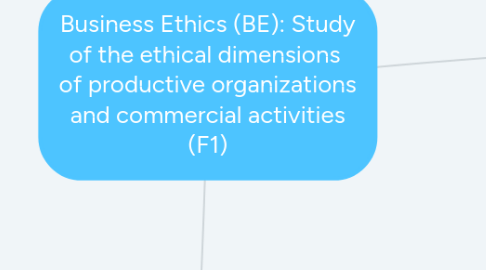
1. Theorical Framework
1.1. Disciple facts. F1
1.1.1. The study of these professional practices is conducted by: 1. Normative Business Ethicists: Engaged in the study of right or not right dilemma. 2. Social Scientists: Engaged in the descriptive labor of the discipline.
1.2. Framework: Business ethics can be thought in different frameworks. F1
1.2.1. Corporate Model Agency (CMA): States that there are moral obligations of agents engaged in a activity. This framework is called Corporate Moral Agency. This theory considers firms as “full – fledged” moral persons.
1.2.1.1. Analysis Agent: Firm. Analysis Problem Who should be managed for (ends)? Who should manage them (means)? Analysis Problem Who should be managed for (ends)? Who should manage them (means)?
1.2.1.1.1. Ends of the firm Shareholder primacy (promise of managers to stakeholders) or stakeholder balance (balance of iterest is better than wealth creation)?
1.2.1.1.2. Means of the firm (Governance structure): Control of shareholders (Friedman – 1970) or other participation (Worker participation to avoid oppresion)?
1.2.2. Other 1. Virtue Theory (Moore) 2. Kantian 3. Justice Fairness (Rawls) 4. MFA
1.3. Ethical considerations in Business Administration. F1
1.3.1. Ethical issues and commercial activities 1.Sales 2.Safety 3. Advertising 4. Pricing
1.3.2. Ethical issues and Labor 1. Hiring and Firing 2. Meaningful work
1.3.3. Ethical issues and Society Corporate Social Responsability: actions undertook by businesses that are not legally required and benefit other parties other than the corporation.
1.3.3.1. Political Background
1.3.3.2. International Background
2. Business World vs Theory
2.1. Typical Business Justifications to cross boundaries. F3
2.1.1. Pushing limits but not crossing boundaries: "if the law does not mention that it is not acceptable then by definition it should be acceptable" F3
2.1.2. Ethics are grey by default: "this system is unquestioned and becomes the default setting"F3
2.1.2.1. Ejemplo: Flash of genius. The fight of Robert Kearns, the creator of the windshield a against the most important car company in the USA, demostrates the point of De Cremer about the need of questioning the system that is taken by default. The act of Kearns made possible that the justification of Ford about the lack of power and the wide range of options given by the law was not an obstacle for doing things right and keep perpetuating the grey shaded business sytem.
3. What to do about crossing boundaries in ethics? The answer is not more control systems, the answer is that managers are made aware of the psychology behind decisions taken in the context of moral dilemmas. F3
3.1. ¿ What should be the purpose of BE to managers?
3.2. ¿Has the actual BE a tool for managers to solve that kind of dilemmas?
3.2.1. The lack of fit of the BE theory to managers day to day is caused by three mistakes: 1.Too general statements 2. Too Theorical 3. Too impractical F2
3.3. ¿What developments and improvements are being developed in the BE area?
3.3.1. In order to solve the lack of fit to accomplish the objectives of BE, Ethics is developing to focus more on the design of structures that allow managers take better decisions rather than focusing on the classical matter of motivation between neoclassical economists and Businesses Ethicists
3.4. ¿What Should be the objective of BE?
3.4.1. The actual BE should give managers ideas of the course of action in gray situations and ways to handle pressure from other agents when the course is defined. F2

